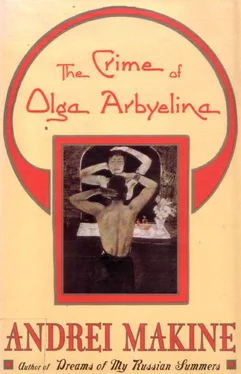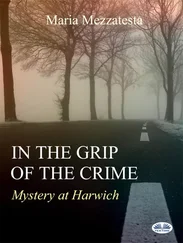The word shattered into a number of memories, each one earlier than the last. They reverberated in the night of the first snow and even before that night. During the night when the sleeping draft had not worked. And even earlier, when for the first time she had surprised that young stranger beside the kitchen range. And even further back than that in her memories. That old overcoat of her husband's on the youth's naked body. The previous winter she had darned it and, seeing it on her son's shoulders, had had to make a rapid, strenuous effort not to think about her husband's body… And her unique evening dress. And the unique opportunity for wearing it- the evenings when L.M. took her to the theater. She would arrive at Li's house and entrust the boy to her and begin to make herself ready. When she went out, dressed, with her hair up and perfumed, her neck and shoulders very pale, the boy observed her with an insistent and hostile look. That made her laugh. She embraced him, enveloping him in her perfume, ruffling his hair and tickling his ear with her warm voice, imitating a lover's voice, which is, in its turn, an imitation of the voice we use in speaking to children… And there were also the slippers. As quite a young child he had put them on one day for fun when she was still in bed and gone out into the corridor making the soles clatter on the floor. She had protested feebly; he had not obeyed her. She had been overwhelmed by an acute pleasure, that of feeling herself tenderly dominated, of not knowing how to or wanting to resist…
Pushing the box back onto the top of the closet she climbed down from the stool. Now it had all been said. There was nothing else to understand. She knew everything, even that: the word "incest" had already resounded within her but in such cavernous depths of her mind that, surfacing into speech, it had been transmuted into "crime," "monstrousness," "horror." Like those deep sea fish which, drawn to the surface, explode or transform themselves into an unrecognizable lump of flesh.
Even the rhythmic spasm that her final discovery had provoked in her was from now on familiar to her. The hand that arose in the pit of her stomach, pressed on her lungs, taking her breath away; gripped her heart, a bunch of grapes that the hand either squeezed or released, at every thought, then suddenly crushed until there was a red hot throbbing in her temples.
She knew equally that all the means of salvation she had imagined in fact only added up to one. To break the curse of those nights she must both flee and remain; explain herself and above all say nothing; change her life and continue as if nothing had happened; both die and live while forbidding herself all thought of death.
"During the first night the curtains were drawn, during the second, open," she recalled for no reason. Yes, the reason for it was her headlong flight forward, proof that she was already living the life where one could neither live nor die.
It was with the feeling of embarking on this new life, a step at a time, that Olga drank her tea, left a note for her son, and went out, as she did every Sunday morning. She walked through the streets of the lower town, gray streets, their pavements strewn with tiny granules of snow. Without admitting it to herself she was hoping for a sign, a jolt in this provincial calm that might have attested to the irremediable yet utterly mundane deformation of her life. A woman who lived at the Caravanserai appeared at the end of the street, drew level with her, and, after greeting her, asked,"Are you going to Paris?"
"No, I was going for a walk…"
Olga waited for the street to become empty again, then turned toward the station.
In the train, watching the dismal fields and the little towns devoid of life floating past, her heart like a crushed bunch of grapes, she repeated several times, "Enough said. Impossible to live. Impossible to die…"
The train stopped for a few minutes in a little station beyond which there arose the sad, dull houses of a village similar to Villiers-la-Forêt but rendered even more inanimate by this cold, windy day. The only thing that attracted her eye was a window squeezed into the recess of a tiny yard. All around was the network of the alleyways, the naive jumble of doors, roofs, overhanging top stories: and then this window, lit by the feeble light of one bulb, with its Sunday-morning calm…
A sudden intuition struck Olga; she turned away. So somewhere in this world there could be a place where what she had to live through could be lived! A life beyond "Enough said." A secret life, inaccessible to others. Like the one hidden behind the window that a distracted passenger on a train had just noticed.
As she was emerging from the Metro in Paris she felt the tiredness and the nervous exhaustion of the past weeks catching up with her. The steps of the staircase suddenly gave way under her feet; she clung to the . And with half-closed eyes she heard a plaintive, almost childish voice within her begging, "Please make Li understand! If only she can guess everything and tell me what to do. If I can just have a moment of peace…" As she resumed her journey she recognized in this tone close to tears the old familiar voice of the "little bitch."
"When we were at school before the revolution, you remember the plank the headmistress made them tie to the backs of the girls with stooping shoulders, so they held themselves straight. You could tell them a mile off, the poor crucified things, with their shoulders square and their backs straight… And then one fine day no more planks! The newspapers talked about liberty and emancipation…"
She was trying to explain to Li the feeling that had been an unconscious element in all her thoughts since adolescence. The feeling that one day life had lost all its rectitude, correctness, regularity. One day a strange whim had crept into their lives in Russia, into the whole country. Suddenly they had been seized with the desire to prove that this rectitude was no more than a chimera, a shopkeeper's prejudice. And that one could live disregarding it, or, better still, thumbing one's nose at it. Furthermore, life itself seemed to confirm this: a Siberian peasant appointed and dismissed ministers; he "purified" (as he called these couplings) the Tsarina's ladies-in-waiting and even, according to malicious tongues, the Tsarina herself-all of them being in thrall to his inexhaustible carnal drive. Newspapers portrayed the Tsar as an enormous oval pair of buttocks surmounted by a crown. Killing a policeman became an exploit in the name of liberty… And then one day they had stopped strapping planks to the backs of stooping schoolgirls.
In explaining this Olga suddenly believed she could understand herself. Yes, once the planks had been removed everything in the country collapsed. In her memory it was the recollection of a purely physical slackening. For a time to be twisted and ungainly had become quite the fashion… In the very spring when their backs had been liberated she had taken part in a masked ball for the first time. Walking down a corridor (the portrait of her grandmother had been hung upside down) she had come upon a man and a woman coupling in an armchair. And like millions and millions of people at that time she had discovered that a certain order of things was cracking apart, on the brink of crumbling, or indeed that there was no order, no rectitude, merely servile custom binding them (like the plank at your back) to laws that were said to be natural… Later she found herself listening to the poet who fixed bear's claws to his fingers. Another poet claimed he drank champagne from the skull of his suicidal beloved. And then there was that patron of the arts who commissioned an icon portraying a huge naked succubus…
And for a few days each of these caprices, like a drug, offered an intoxicating sense of liberation; but stronger and stronger doses were soon needed, more and more bizarre combinations. They all of them aspired to the ultimate caprice, the one that would have liberated them from the last trappings of this world. She herself had had this feeling one evening in St. Petersburg, returning from a party with a man who pretended to believe what she was telling him in extravagant and funereal tones. She said she was only willing to give herself to a man who would agree to kill her afterward. Or was it before? Obsessed with her playacting she herself forgot the original version. This man, the painter who had just invented "Stripeism," was confident that this seventeen-year-old girl would soon be his umpteenth mistress. And he had no intention of killing her, either afterward or (especially not) before. But he was playacting and hardly noticing that he was playacting. As for her, by dint of thinking and talking about "the curse that had blighted her blood," she had ended up believing that it was to her future lover that she would pass it on and not to her child…
Читать дальше












